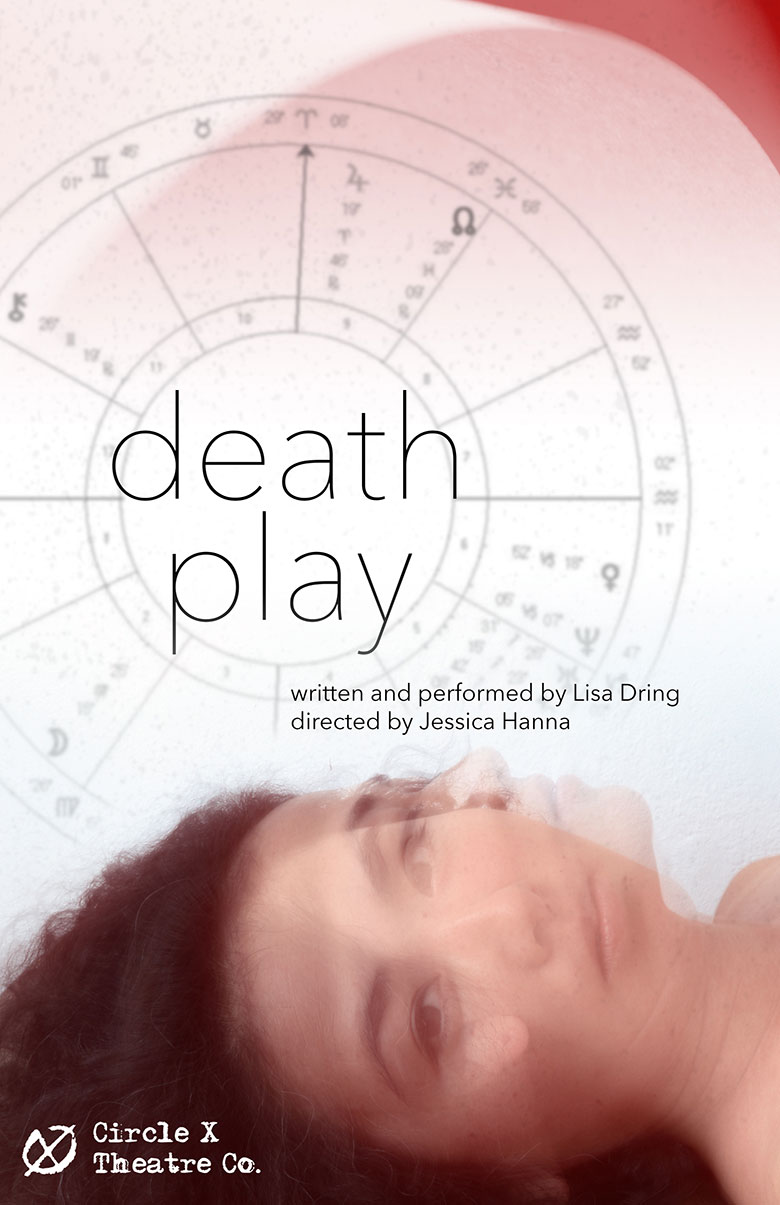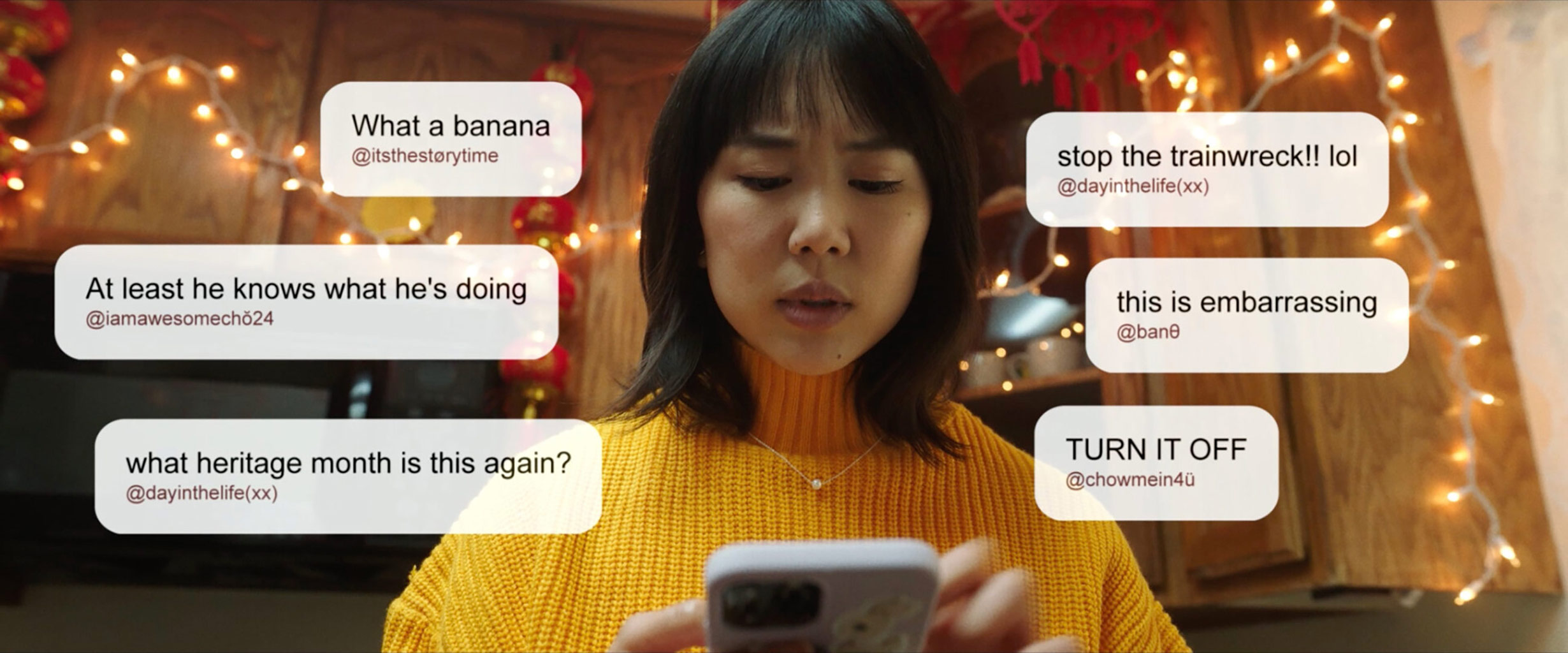Dring would know. Having lost her estranged father, beloved mother, and half-understood Japanese grandmother by the wee age of 25, Dring uses Death Play as a beautifully lonesome exploration of what it is to grieve — and what it is to find an exorbitant amount of humor in it, even while being stripped completely bare. As she first takes the stage, one sees her hunched-over figure to the sound of her obnoxious, ear-piercing wail, and all of it reads tragicomically as simultaneously funny and sad, like the mythologically thin line between love and hate.

Dring uses these vagaries throughout Death Play. She bounces skillfully across a spectrum of desolate greys and rainbow joys, shapeshifting and chameleoning herself in ways that honor the complexities of raw human emotion. Watching her, I could only imagine how simultaneously cathartic and just plain crazy it must feel to air everything out so publicly, but Dring does so in inventive ways. When confronting issues of body shame, she isn’t afraid to launch into a percussive chant about which of her body parts will “do” or are “okay”, and she actively uses stereotypes, mimicking her Japanese grandmother in a way that non-ethnic persons would never get away with and would probably decry as un-PC.
Other times, however, Dring’s storytelling is more personal, like private confessions to a friend. It also never shies away from what is shameful. Using a Buddhist Vipassana retreat — a good way to “unpack your entire suitcase in ten American days”, she jokes — Dring finds a vehicle to imply repressed memories of sexual abuse. In another notable moment, Dring explains that her grandmother worked in a sweatshop in downtown Los Angeles, just miles from where her mother paid for her 160 thousand dollar theatre school education. She even admits that force-feeding her cancerous and tumor-ridden mother may have caused her pneumonia, and seems bewildered that she laughed at her mother’s death bed, over something as simple as ice cream dribbling down the woman’s chin. Such honesty is rare and to be praised, especially coming from the generally demure and theatre arts-avoidant Asian-American female.
On her website, Dring explains that, “The play calls in the archetypes of maiden, mother and crone, allowing me to explore my shifting identity. DEATH PLAY also challenges us to look at how we envision and interact with the crone. Women in America are consistently shamed by age. We don’t hold any reverence for feminine power beyond the beauty of her skin, and if we followed much of the media it would appear that the worst thing a woman could do would be to have the audacity to become old. This play asks us to take a deep, dark look at the crone, and find out why we are so frightened.”
I believe this description to be limited — very limited. And honestly, a bit of a misdirection. While Death Play does conclude heavily on the note of female age-shame, that issue seems significant primarily because it is uniquely personal to Dring. Her mother would repeatedly warn her that she would rather be taken out back and shot than to grow old, and following her early death, those words echoed as frustrating and traumatic. It makes sense that Dring would latch onto those points as important, because they are, for her. Yet it is Death Play‘s universality that should be recognized, even through its veneer of exaggerated humors and caricature.
ARTICLE CONTINUES BELOW

Death Play‘s beautifully minimal set features a thousand hand-folded paper cranes, and its lighting and sound design flawlessly transition Dring through polarized moods and implied locales. A simple archival song here serves as the backdrop for telling a misguided “love story” about her grandpa and grandma; a simple blue glow there transforms a meaningless white table into a hospital waiting room.
These elements are almost universally lauded as tasteful. Dring’s writing and delivery, however, are more controversial. LA Times’ Philip Brandes writes that “Passion and conviction abound in this free-associative, nonlinear chronicle of Dring’s rocky relationships with her deceased forebears — a disapproving grandmother, subservient mom and, yes, alcoholic father. Amid the episodic specificity, though, there’s very little in the way of broader resonance. Potentially fruitful cultural aspects of her story — her mixed-race parentage, for example, or her grandmother’s time in a World War II internment camp for Japanese Americans — receive barely a passing mention.”
Deborah Klugman of Stage Raw says that “Dring’s physical and verbal carryings-on are so wildly un-tempered and unpolished, and her outlook so in-your-face narcissistic, that her show is a turnoff.”
“A few of the writing passages have a nice flow to them,” Klugman continues later, “and Dring’s celebration of her (half) Asian heritage is also a positive, among a slew of negatives.”
I will admit that Dring’s performance can be abrasive and downright loud at times, with its imitations of shrieking babies or hunched-over grandma crones that are anime-like in their depiction. Yet as much as I hate to make it about race, these reviewers are clearly searching for performer that will cater to their interests and bring to stage their life stories — as opposed to allowing a performer to tell her own. Both Brandes and Klugman verbally eye-roll the points with obviously broader resonance — such as that of her “subservient mom, and yes, alcoholic father” — and instead state that the major point Dring should have discussed more is her mixed-race heritage. Pardon my French, but that is fucking bullshit.
For good reason, these reviewers clearly don’t understand what it is to be a minority female from an immigrant household, and thus, put that idea up on a pedestal as the only thing truly worth speaking about. This makes Dring herself a stereotyped character, despite the fact that she is much more American than Asian. Perhaps this removal from total identification with Dring as a regular human being lessens the emotional connection for these reviewers and allows them to analyze the entire play from a more logical, analytical mindset. As for my first generation Asian-American self, who has a strong personal connection to every aspect of the ideas Dring threw out — with the exception, hilariously, of death — Dring’s stories were highly emotional, and it’s not just because I am Asian-American. Its wide-reaching spiritual-societal connotations were what touched me — and regardless what reviewers might say, I don’t believe I am the only one who felt that touch.
Towards the end of her performance, Dring asked an audience member to hand her one of the thousand cranes which adorned the set. Inside was someone’s story about grieving the death of her son. Dring then invited the audience to take a crane home with them, and upon their departure, to share one of their own memories of grief.
The audience was not full of Asian-American kids from immigrant households. In that way, they were not like I, and not like Dring. One could have suspected that, like Brandes and Klugman, they would be completely disconnected from the material. But they weren’t. Nearly everyone in the theatre — male and female, some teary-eyed and sniffling — took his or her moment to share something from the heart. That share would later be folded into a paper crane, which is a Japanese symbol for peace and the wish of hope, and will likely be used in a future installment of Death Play.
Perhaps Death Play is divisive, and perhaps it doesn’t speak of death as much as some people want it to. But for those who aren’t looking for a recreation of their own reality, it may be just the thing: powerful and connective because it is human; honest and dynamic because it’s Lisa Dring, speaking from her boisterous and tragicomic heart.
Written and Performed by Lisa Dring
Directed by Jessica Hanna
Produced by Camille Schenkkan
Associate Produced by Ian-Julian Williams and Jen Kays
Set and Lighting Design by Kirk Wilson
Co-Lighting Design by Joey Guthman
Sound Design by Jeff Gardner, with additional sound by Ray Salas
Costume Design by Ann Closs-Farley
Stage Managed by Candice Clasby
House Manager: Wellesley Daniels
Performances through April 23rd at Circle X Theatre in Los Angeles.
Ω






